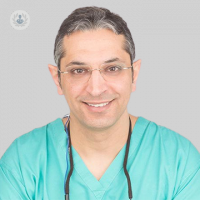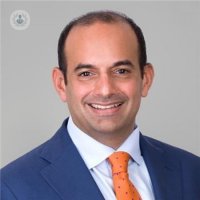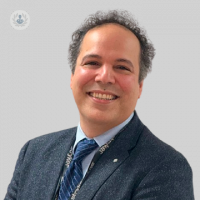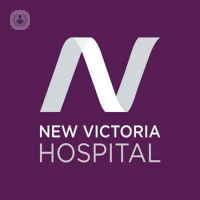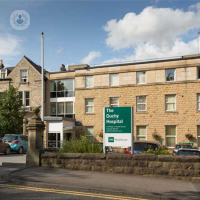What is percutaneous discectomy?
Percutaneous discectomy surgery is a minimally-invasive technique used to treat herniated discs in the spinal column, in the lumbar region as well as the cervical region, without the need for open surgery.

Why is it done?
Disc herniation is a frequent condition that in many cases is incapacitating, sometimes so much so that rest and rehabilitation are not sufficient and surgery becomes necessary.
Medical advancements have led to the availability of minimally-invasive techniques, such as herniated disc percutaneous surgery, which offer greater advantages:
- Small incisions are made to repair the damaged section.
- Wounds in the skin and muscles are minimal.
- Post-operative recovery is much shorter and less painful.
What does percutaneous discectomy involve?
The surgery involves extracting the pulpous nucleus of the intervertebral disc via a small incision in the skin. This is done with the aid of an endoscope, a slim tube fitted with a lens that enables visualisation of structures and tissues on a screen, and fine instruments such as a laser and a radiofrequency probe.
How should I prepare for percutaneous discectomy?
Before herniated disc percutaneous surgery, it's advisable to try and achieve the best physical condition possible, via measures such as:
- Eating well: Good nutrition is key to maintaining a healthy immune system. In the weeks before the operation, eat a balanced diet and take vitamin supplements. This will help to reduce the risk of infection.
- Get fit: Weak muscles and low cardiovascular fitness make post-surgical recovery more difficult.
- Do not smoke. Patients who stop smoking are more likely to have a successful surgery.
What happens after percutaneous discectomy surgery?
You can return home the same day as the procedure and can resume your normal routine within 3 to 5 days after surgery.
What are the alternatives to percutaneous discectomy surgery for treating herniated discs:
- Ozone therapy: There are several techniques for applying ozone locally to the herniated disc, but the most effective and commonly used is paravertebral injection. Its primary advantage versus other techniques is its efficacy: it has a 90 per cent success rate, as it is an outpatient treatment with few side-effects and is very well tolerated by patients.
- Orthokine therapy: In this technique, proteins and growth factors obtained from the patient’s own blood are injected into the affected area. The blood is extracted with syringes, incubated and centrifuged to create a blood serum that's then reinjected into the joint.
Herniated disc percutaneous surgery
Mr Khalid Salem - Orthopaedic surgery
Created on: 11-13-2012
Updated on: 08-24-2023
Edited by: Karolyn Judge
What is percutaneous discectomy?
Percutaneous discectomy surgery is a minimally-invasive technique used to treat herniated discs in the spinal column, in the lumbar region as well as the cervical region, without the need for open surgery.

Why is it done?
Disc herniation is a frequent condition that in many cases is incapacitating, sometimes so much so that rest and rehabilitation are not sufficient and surgery becomes necessary.
Medical advancements have led to the availability of minimally-invasive techniques, such as herniated disc percutaneous surgery, which offer greater advantages:
- Small incisions are made to repair the damaged section.
- Wounds in the skin and muscles are minimal.
- Post-operative recovery is much shorter and less painful.
What does percutaneous discectomy involve?
The surgery involves extracting the pulpous nucleus of the intervertebral disc via a small incision in the skin. This is done with the aid of an endoscope, a slim tube fitted with a lens that enables visualisation of structures and tissues on a screen, and fine instruments such as a laser and a radiofrequency probe.
How should I prepare for percutaneous discectomy?
Before herniated disc percutaneous surgery, it's advisable to try and achieve the best physical condition possible, via measures such as:
- Eating well: Good nutrition is key to maintaining a healthy immune system. In the weeks before the operation, eat a balanced diet and take vitamin supplements. This will help to reduce the risk of infection.
- Get fit: Weak muscles and low cardiovascular fitness make post-surgical recovery more difficult.
- Do not smoke. Patients who stop smoking are more likely to have a successful surgery.
What happens after percutaneous discectomy surgery?
You can return home the same day as the procedure and can resume your normal routine within 3 to 5 days after surgery.
What are the alternatives to percutaneous discectomy surgery for treating herniated discs:
- Ozone therapy: There are several techniques for applying ozone locally to the herniated disc, but the most effective and commonly used is paravertebral injection. Its primary advantage versus other techniques is its efficacy: it has a 90 per cent success rate, as it is an outpatient treatment with few side-effects and is very well tolerated by patients.
- Orthokine therapy: In this technique, proteins and growth factors obtained from the patient’s own blood are injected into the affected area. The blood is extracted with syringes, incubated and centrifuged to create a blood serum that's then reinjected into the joint.
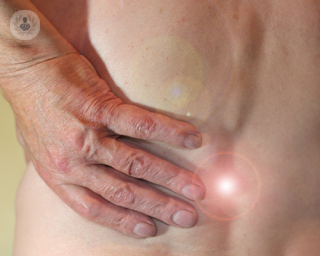

Do I have sacroiliac joint pain or a herniated disc?
By Professor Amarjit Anand
2025-01-13
Learn from a leading spinal surgeon about the overlapping symptoms of sacroiliac joint pain and a herniated disc, as well as how a diagnosis is made and what treatment is available. See more


Herniated disc: what is it, and why does it cause sciatica and lower back pain?
By Mr Khalid Salem
2025-01-13
Learn all about lumbar disc herniation and its treatment. See more
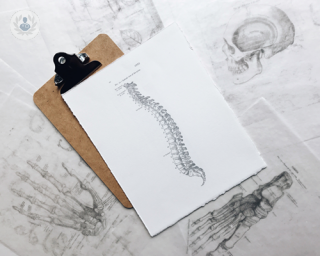

Myelopathy: Does it ever go away?
By Mr Andraay Leung
2025-01-13
Myelopathy is a spinal cord condition that occurs due to compression, leading to a range of symptoms that can impact daily life, such as pain, weakness, numbness and coordination difficulties. Whether or not myelopathy can fully resolve depends on several factors, including its cause, severity, and how early it's treated. See more


What we need to know about lumbar herniated discs
By Mr Rohit Shetty
2025-01-10
Here, revered consultant orthopaedic and spinal surgeon, Mr Rohit Shetty, sheds some expert light on all things lumbar herniated discs, including some red flags to watch out for. See more
Experts in Herniated disc percutaneous surgery
-
Mr Alexander Montgomery
Orthopaedic surgeryExpert in:
- Back injuries
- Back pain
- Herniated disc percutaneous surgery
- Minimally invasive spinal surgery
- Spinal fusion
- Spinal osteoarthritis
-
Mr Daniel Fagan
Orthopaedic surgeryExpert in:
- Kyphoplasty
- Degenerative disc disease
- Minimally invasive spinal surgery
- Herniated disc percutaneous surgery
- Spinal disc replacement
- Low back pain
-
Mr Reza Mobasheri
Orthopaedic surgeryExpert in:
- Lumbar herniated disc
- Herniated disc percutaneous surgery
- Spinal fusion
- Sciatica
- Back pain
- Spine fracture
- See all

Cleveland Clinic London Hospital
Cleveland Clinic London Hospital
33 Grosvenor Place
No existe teléfono en el centro.
By using the telephone number provided by TOP DOCTORS, you automatically agree to let us use your phone number for statistical and commercial purposes. For further information, read our Privacy Policy
Top Doctors

New Victoria Hospital
New Victoria Hospital
184 Coombe Lane West, Kingston upon Thames, KT2 7EG
No existe teléfono en el centro.
By using the telephone number provided by TOP DOCTORS, you automatically agree to let us use your phone number for statistical and commercial purposes. For further information, read our Privacy Policy
Top Doctors

The Duchy Hospital - part of Circle Health Group
The Duchy Hospital - part of Circle Health Group
Queen's Road, Harrogate HG2 0HF
No existe teléfono en el centro.
By using the telephone number provided by TOP DOCTORS, you automatically agree to let us use your phone number for statistical and commercial purposes. For further information, read our Privacy Policy
Top Doctors
-
Cleveland Clinic London Hospital
33 Grosvenor Place, Central LondonExpert in:
- Cardiology
- Colorectal surgery
- Minimal access surgery (keyhole surgery)
- Gallbladder surgery
- Diagnostic Imaging
- Ultrasound
-
New Victoria Hospital
184 Coombe Lane West, Kingston upon Thames, KT2 7EG, South LondonExpert in:
- Cardiology
- General Surgery
- Orthopaedic surgery
- Breast augmentation
- Pain management
- Spine
-
The Duchy Hospital - part of Circle Health Group
Queen's Road, Harrogate HG2 0HF, HarrogateExpert in:
- Cardiology
- General Surgery
- Plastic surgery, reconstructive and aesthetics
- Diagnostic Imaging
- Ophthalmology
- Otolaryngology
- See all
- Most viewed diseases, medical tests, and treatments
- Ulnar nerve entrapment
- Peripheral nerve block
- Peripheral neuropathy
- Joint pain
- Lumbar herniated disc
- Spinal surgery
- Minimal access surgery (keyhole surgery)
- Shoulder pain
- Osteoporosis
- Botulinum toxin (Botox™)
